ADVERTISEMENT
Photos
Haitian President Franck Sylvain, General Leon Cantave, Fignole
Here is a picture of Haitian President Franck Sylvain, General Leon Cantave, Daniel Fignolé
President Franck Sylvain's Two-Month Presidency
Franck Sylvain, born August 3, 1909 in Grand Goâve, was an attorney, judge, politician, and short-term president of Haiti.
During his political career he held conservative views, establishing in 1934 an anti-communist newspaper "The Crusade". In party politics he led, establishing an underground political organization, "Gathering of the Haitian People".
Parliament selected him as President Joseph Pierre-Louis's successor. He served 56 days before being ousted by General Leon Cantave. His memoirs are entitled The 56 Days of Franck Sylvain.
Artist Ulrick Jean-Pierre painted Sisters of the Holy Family in New Orleans
Here is a painting of Haitian Artist Ulrick Jean-Pierre as he painted Sisters of the Holy Family in New Orleans.
A freed Haitian slave, Henriette Delille's work has been honored with a painting hanging in the Sisters of the Holy Family Motherhouse in New Orleans, she founded.
Delille dedicated herself to ministering to the sick and poor, providing an education to them, especially blacks.
Haitian artist Ulrick Jean-Pierre succeeded, according to Sister Jupiter, to define ". . . her spirit, her ministry, and the culture of the city she ministered to"
The Catholic Church is considering Delille for canonization, the first African-American honored.
Thomas Jacques, Minister of Agriculture, Natural Resources and Rural Development
Here is a picture of the current Minister of Agriculture, Natural Resources and Rural Development in Haiti, Mr. Thomas Jacques.
Agriculture Minister Thomas Jacques expressed his gratitude to actors in the agriculture sector for helping him realize several outcomes for 2014, among them:
• Reforming the retirement plan of agricultural executives
• Progress made on updating 20-plus watersheds
• New irrigation systems
• Reforming the import tax system
• Extending the soil survey project nation-wide
He praised the peasant class for its cooperation in raising its output and offered his appreciation to new businesses for their hard work.
Faustin Soulouque as Emperor of Haiti, Faustin I
Here is the Emperor of Haiti, Faustin Soulouque as Faustin I. A former career officer and general in the Haitian Army, was proclaimed Emperor of Haiti under the name Faustin I.
Once Soulouque had conquered the Boyerists he decreed himself Emperor Faustin I with Parliament's approval. In office, he adopted an attitude of suspicion toward Black leaders he thought were conspiring against him.
Faustin's foreign policy was to protect Haiti and Santo Domingo from foreign interference. He tried without success to annex Santo Domingo to unify the island of Hispaniola. Defeated after his final attempt he came back to Port-au-Prince. He was losing power, with no progress being made in Haiti, and his reputation as a merciless dictator furthered his decline.
In 1858 Fabre Geffrard managed a coup d'etat and became president. Faustin went into exile in Kingston, Jamaica where it was widely reported he died. But Haitian historian MacLeod writes Faustin actually died in Petit-Goâve.
Crown of Emperor Faustin I, Faustin-Élie Soulouque
Here is the Crown of Emperor Faustin I, as Faustin-Élie Soulouque was proclaimed Emperor of Haiti under the name Faustin I in 1849
Faustin Soulouque came to power as Haiti's president in 1847 when the mulatto-elite Boyerists recruited him after President Riche passed on. He was seen as old, lacking authority, and weak-willed. But the Boyerists were proven wrong when Soulouque, after bowing to their authority, staged an overthrow, was appointed president, and quickly set about massacring them.
Soulouque was born as a slave circa 1782 in Petit-Goâve, but became a freed man later. To assure his freedom, because the French were trying to force slavery on the Haitians again, he joined the Black revolutionary army. He was part of the revolt driving the French out of Haiti, staying in the military until the unsuspecting Boyerists selected him as president.
The coronation of Faustin I - Ceremony, Faustin Soulouque
Here is a picture of the coronation of Faustin I. In 1849, Faustin Soulouque was proclaimed Emperor of Haiti under the name Faustin I.
Soulouque ascended the ranks of the Haitian military over the next forty years, ending up as Lieutenant General and Supreme Commander of the Presidential Guards. When President Riche passed away in 1847 the Boyerist ruling class needed another figurehead as president. They picked Soulouque, thinking he was unintelligent and ill-informed. Soulouque did their bidding at first but turned on them and declared himself a dictator. He began a campaign of genocide against the mulatto-elites, and in 1849 Parliament decreed Soulouque Emperor of Haiti, Faustin I. Three years later he and his wife Adelina were crowned Emperor and Empress.
Faustin protected Haiti's sovereignty from foreign threats and unsuccessfully tried to divest the Dominican Republic of theirs. In 1846 military leader Fabre Geffrard staged a coup d'etat, driving Faustin into exile, becoming the next president. Faustin was exiled to Kingston, Jamaica and many believed he died there. But historian Jacques Leger claims Faustin died in Petit-Goâve, having snuck back into the country.
Faustin Soulouque coronation ceremony as Faustin I
You are looking at Faustin Soulouque coronation ceremony
Faustin Soulouque, an officer of the highest rank in the Haitian army, defied expectations and became a Haitian president, who knew how to take and hold power during his rule. Soulouque was born in Petit-Goâve in 1782 a slave, but later gained his freedom when the Saint-Domingue Civil Commissioner abolished slavery due to the slave revolts occurring then. However the French government tried to reinstitute the practice of slave ownership, and Soulouque, in an attempt to hold onto his freedom, signed on with the Black revolutionary army.
Teleco Seeks $240 Million Settlement from Haitel
Haitel became Haiti's original mobile phone system in 1998. In a licensing agreement, worth $14.5 million, Haitel received authorization to use Les Telecommunications d'Haiti's (Teleco) radio frequency band for a period of 15 years. Under the agreement Teleco and Haitel were to resolve any disagreements in a Haitian court.
Matters became complicated when the parties signed a second agreement in 1998, in which Haitel held shares in escrow as collateral to secure its debt to Teleco. An arbitration clause specified the two firms seek arbitration for any conflicts.
The trouble began when Teleco said Haitel made use of the frequency band from 1998 to 2007, but stopped paying licensing fees. Teleco demanded Haitel honor its debt under the licensing agreement. Haitel said it owed Teleco just $4.8 million under the shareholder agreement, and it would be paid in stocks, not cash.
Teleco insists the shareholders agreement is not valid because no evidence exists Teleco's board of directors ever authorized the general manager to mediate or sign the shareholder's agreement. U.S. District Judge Jack Weinstein agreed in a ruling he made on the case.
Teleco is suing Haitel for $240 million for licensing agreement fees Haitel defaulted on from 1998 to 2007 Haitel wants to go to arbitration, but has forfeited its rights according to Haitian law by being involved in protracted legal proceedings in Haiti.
Currently Teleco's legal action against Haitel is awaiting a ruling from Haiti's High Court, while Haitel is in bankruptcy proceedings.
The ruins of the residence of President Fabre Nicolas Geffrard - Anse -a -Veau .
Here is a picture of the ruins of the residence of Former Haitian President President Nicolas Fabre Geffrard at Anse -a -Veau.
During his time in office Geffrard had some modest accomplishments in the spheres of administration, justice, the economy, education, finance, agriculture, and the military. He supported trade agreements and increased exports with the opening of ports in Aquinas, Miragoane, and Saint Marc. He also updated the political infrastructure of the government. An adept negotiator he was instrumental in helping the Dominican Republic retain its sovereignty.
In 1858 he was asked by the military to lead an insurrection against Faustin I and was successful, establishing his claim to the presidency in Gonaives. Geffrard stayed in office for eight years, before he was ousted by Sylvain Salnave, whom the country now favored. Although he had decreed himself president for life, his successor, Salnave, was elected to replace him. Geffrard resigned without protest and retired to Kingston, Jamaica where he died in 1878.
Fabre-Nicolas Geffrard
Here is a picture of President Fabre-Nicolas Geffrard. He was a mulatto general in the Haitian army and President of Haiti from 1859 until his deposition in 1867
Fabre Geffrard, born September 19, 1806, ruled as president of the Republic of Haiti from 1859�'1867. His first act in office was to resurrect the Constitution of 1846 thereby making him president for life. Prior to assuming the presidency he served as Commander-in-Chief of the Army during Emperor Faustin I Soulouque's reign.
Using his powerful position as a stepping stone, he forced the abdication of Soulouque when Geffrard moved to establish the Republic of Haiti in Gonaïves. The country rallied behind him and Faustin I surrendered the presidency to Geffrard when he realized he had lost the support of the populace.

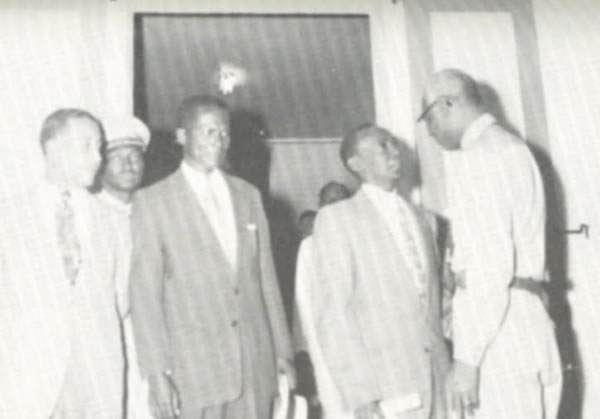

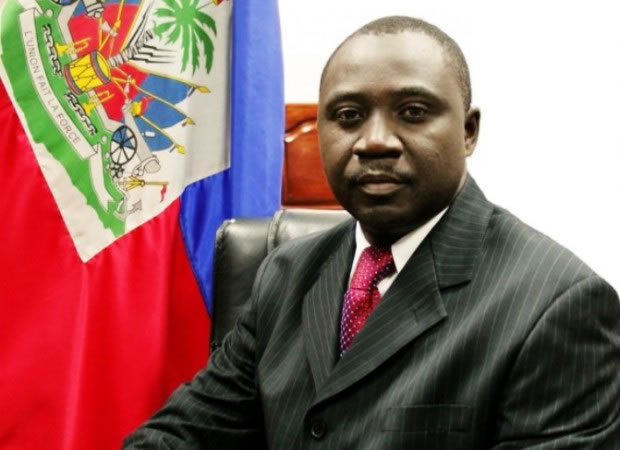
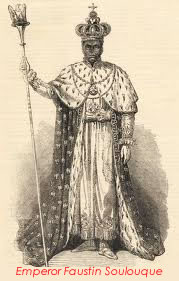
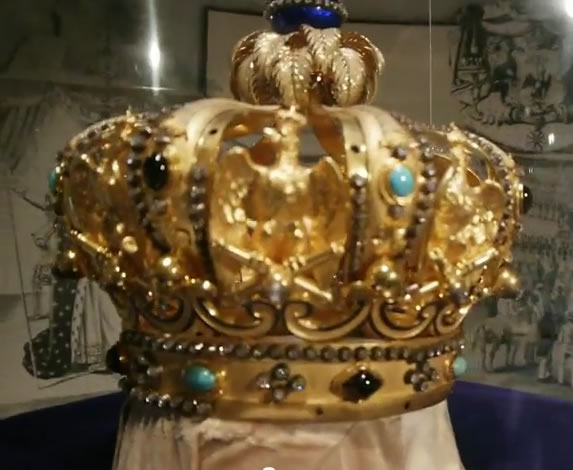
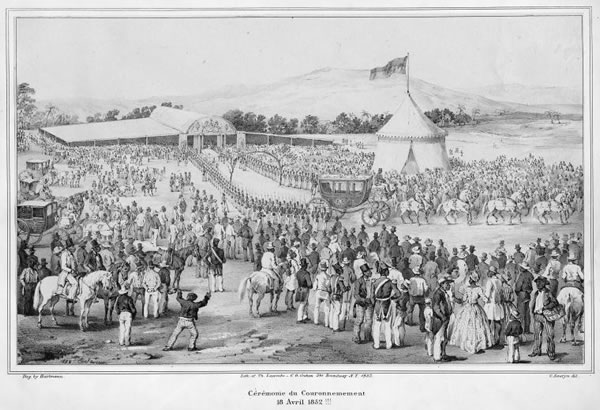
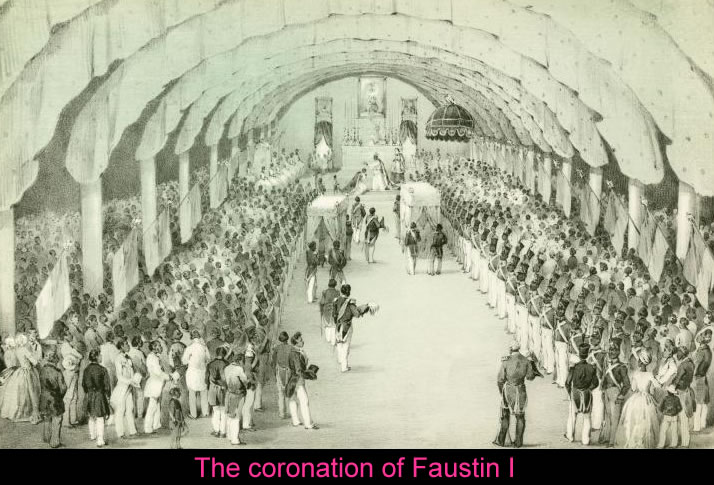

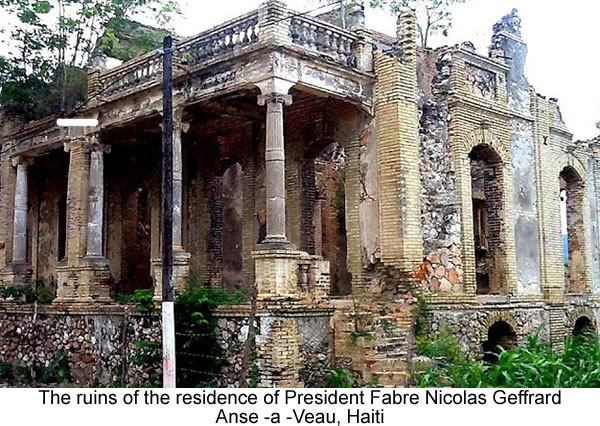
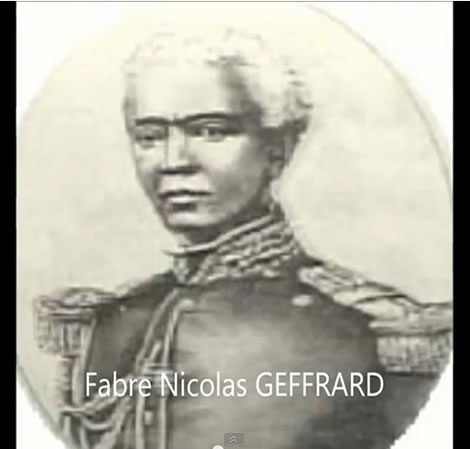
 Hotel Beck in Cap-Haitien, Haiti
Hotel Beck in Cap-Haitien, Haiti  Royal Decameron Indigo and White sands
Royal Decameron Indigo and White sands  Nouveau College Bird in Port-au-Prince, Haiti
Nouveau College Bird in Port-au-Prince, Haiti  The Petro Caribe Challenge hashtag
The Petro Caribe Challenge hashtag  Haiti Street Food, manje kwit or Chin Janbe, for $1 or less
Haiti Street Food, manje kwit or Chin Janbe, for $1 or less  Haitians, the second largest black immigrant group in the US
Haitians, the second largest black immigrant group in the US  Haitiano-Japanese Naomi Osaka wins the US Open against Serena...
Haitiano-Japanese Naomi Osaka wins the US Open against Serena... 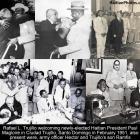 Rafael L. Trujillo welcoming Paul Magloire in Santo Domingo
Rafael L. Trujillo welcoming Paul Magloire in Santo Domingo 



